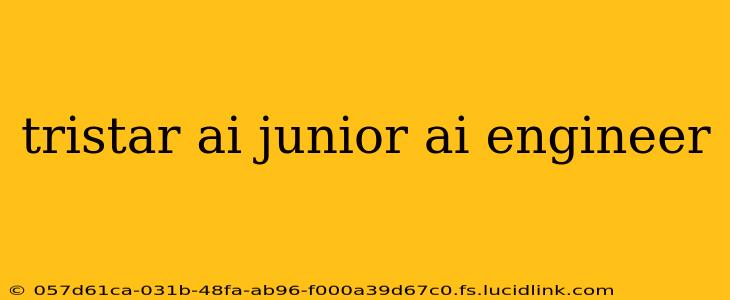The field of Artificial Intelligence (AI) is booming, and with it, the demand for skilled professionals, especially junior AI engineers, is skyrocketing. If you're aspiring to become a Junior AI Engineer at Trista AI (or any company in the field), understanding the role, required skills, and the path to securing such a position is crucial. This guide will walk you through everything you need to know.
What Does a Junior AI Engineer at Trista AI Do?
While specific responsibilities may vary depending on the company and project, a Junior AI Engineer at Trista AI, or any similar organization, would likely contribute to:
- Data preprocessing and cleaning: This involves preparing raw data for use in AI models, handling missing values, and ensuring data consistency. Junior engineers will learn and apply various data manipulation techniques.
- Model development and training: This is a core function, involving working with established AI/ML frameworks (like TensorFlow or PyTorch) to build, train, and evaluate machine learning models. The focus is usually on assisting senior engineers and learning through practical experience.
- Model deployment and monitoring: Once models are trained, they need to be integrated into systems and monitored for performance. This involves understanding deployment pipelines and using monitoring tools.
- Experimentation and research: Junior engineers often contribute to exploring new algorithms, techniques, or datasets, supporting the broader research efforts of the team.
- Collaboration and communication: Working effectively within a team is vital. Junior engineers need to communicate their progress, findings, and challenges clearly and efficiently.
What Skills are Needed to Become a Junior AI Engineer at Trista AI?
Landing a Junior AI Engineer role requires a blend of technical expertise and soft skills. Here's a breakdown:
Technical Skills:
- Programming proficiency: Strong programming skills in Python are essential. Familiarity with other languages like Java or C++ is a plus.
- Machine learning fundamentals: A solid grasp of core machine learning concepts, including supervised, unsupervised, and reinforcement learning, is crucial.
- Deep learning knowledge: Understanding neural networks, convolutional neural networks (CNNs), recurrent neural networks (RNNs), and other deep learning architectures is highly beneficial.
- Data structures and algorithms: A strong understanding of data structures and algorithms is fundamental for efficient coding and problem-solving.
- Experience with ML frameworks: Practical experience with TensorFlow, PyTorch, or similar frameworks is vital for applying theoretical knowledge.
- Database knowledge: Familiarity with SQL and NoSQL databases is advantageous for managing and querying large datasets.
- Cloud computing (AWS, Azure, GCP): Experience with cloud platforms is beneficial for deploying and managing AI models in production environments.
Soft Skills:
- Problem-solving skills: AI engineering involves tackling complex problems; strong analytical and problem-solving abilities are essential.
- Teamwork and collaboration: AI projects are rarely solo endeavors; effective teamwork and communication are paramount.
- Communication skills: Clearly communicating technical information to both technical and non-technical audiences is crucial.
- Time management and organization: Balancing multiple projects and tasks efficiently is key for success.
- Continuous learning: The AI field is constantly evolving; a commitment to continuous learning is vital for staying current.
How to Prepare for a Junior AI Engineer Role at Trista AI?
- Education: A Bachelor's or Master's degree in Computer Science, Data Science, or a related field is typically required.
- Internships: Gaining practical experience through internships is highly recommended.
- Personal Projects: Developing your own AI projects is a great way to showcase your skills and build your portfolio. Contribute to open-source projects to further enhance your experience.
- Networking: Attend AI conferences and meetups to connect with professionals in the field.
- Online Courses and Certifications: Platforms like Coursera, edX, Udacity, and fast.ai offer excellent courses on AI and machine learning. Consider relevant certifications to boost your resume.
What are the Career Progression Opportunities?
A Junior AI Engineer role serves as a stepping stone to more senior positions within Trista AI or other companies. Potential career paths include:
- Senior AI Engineer: Taking on more responsibility and leadership roles in project development.
- AI Architect: Designing and implementing the overall architecture of AI systems.
- Machine Learning Engineer: Specializing in the development and deployment of machine learning models.
- Data Scientist: Focusing on extracting insights from data and using those insights to inform business decisions.
By dedicating yourself to learning and developing the necessary skills, you can significantly increase your chances of landing a Junior AI Engineer position at Trista AI or a similar organization, paving the way for a rewarding career in the exciting field of artificial intelligence. Remember to tailor your resume and cover letter to highlight your relevant skills and experience, emphasizing your passion for AI and your potential contributions to the company.
